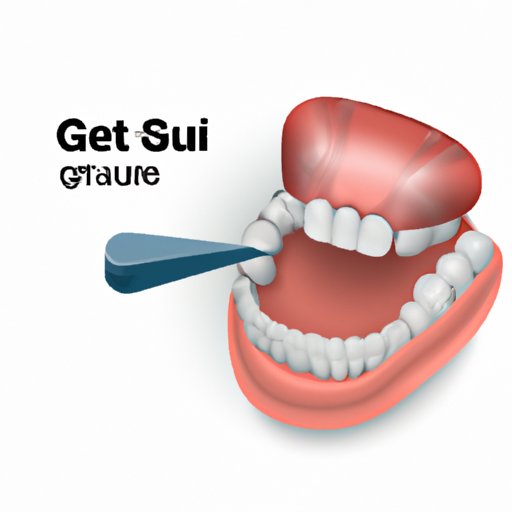
I. Introduction
Plaque is a sticky film of bacteria that can form on your teeth and gums. If left untreated, it can lead to tooth decay, gum disease, and other oral health problems. However, there are plenty of things you can do to reduce and remove plaque buildup. In this article, we’ll share some tips for keeping your teeth and gums healthy and free of plaque.
II. Brush your teeth twice a day
Brushing your teeth twice a day is one of the best ways to remove plaque buildup. Use a fluoride toothpaste and a soft-bristled brush to gently scrub your teeth and gums. Be sure to brush for at least two minutes and cover all surfaces of your teeth.
To make brushing a regular habit, try setting reminders on your phone or keeping a spare toothbrush at work. You may also want to consider using an electric toothbrush, which can be more effective at removing plaque than a manual toothbrush.
III. Floss daily
Flossing is just as important as brushing for removing plaque buildup. While brushing can only reach the front and back surfaces of your teeth, flossing can get in between your teeth and under your gumline where bacteria can hide and cause damage.
Use enough floss to wrap around your fingers and gently slide it in between each tooth, curving it around the base of the tooth as you go. Be gentle and avoid snapping the floss, which can damage your gum tissue.
IV. Use an antiseptic mouthwash
Mouthwash can help reduce plaque buildup and freshen your breath. Look for a mouthwash that contains fluoride and avoid alcohol-based mouthwashes, which can dry out your mouth and cause other oral health problems.
To use mouthwash effectively, swish it around your mouth for 30 seconds and then spit it out. Don’t rinse your mouth with water afterwards, as this can dilute the effects of the mouthwash.
V. Chew sugar-free gum
Chewing sugar-free gum can help stimulate saliva production, which can help wash away bacteria and food particles. Look for gum with natural flavors and avoid sugar, which can feed the bacteria in your mouth and contribute to plaque buildup.
It’s important to note that gum is not a substitute for brushing and flossing. However, it can be a helpful addition to your oral hygiene routine.
VI. Limit sugary and starchy foods
Sugary and starchy foods can contribute to plaque buildup and tooth decay. Try to limit your intake of these foods and opt for healthier snacks like fresh fruits and vegetables, nuts, and cheese.
When you do consume sugary or starchy foods, try to rinse your mouth with water afterwards or brush your teeth if possible. Drinking water instead of sugary drinks can also help reduce plaque buildup.
VII. Visit your dentist regularly
Regular dental checkups are important for identifying and treating plaque buildup, as well as other oral health problems. Try to schedule a checkup with your dentist at least twice a year and make it a priority in your schedule.
Remind yourself of the benefits of regular dental checkups, such as catching problems early when they are easier to treat and preventing more serious problems in the future.
VIII. Use a tongue scraper
Tongue scraping can help remove bacteria from your tongue and reduce plaque buildup. Use a gentle scraping motion to remove the coating on your tongue, being careful not to press too hard or scrape too far back.
Look for a tongue scraper made from plastic or metal and avoid using your toothbrush, which can be too abrasive for your tongue.
IX. Conclusion
Reducing plaque buildup takes time and consistent effort, but it’s worth it for the health of your teeth and gums. By brushing and flossing daily, using mouthwash and a tongue scraper, chewing sugar-free gum, and limiting sugary and starchy foods, you can keep your mouth free of plaque and other oral health problems.
Remember to schedule regular dental checkups and make your oral health a priority.




